Ministry of Jal Shakti
The Two-day National Stakeholder Consultation Workshop on the “Policy Framework for Operation & Maintenance of Rural Piped Water Supply Schemes,” concludes today
Day two of the National Workshop on Policy Framework for O&M of Rural Water Supply Schemes under JJM Focuses on Technology, Transparency, and Data-led Governance
AI, GIS, Space Tech, and Digital Platforms Positioned as Enablers of Sustainable Rural Water Service Delivery
Jal Jeevan Mission Charts Tech-Enabled Future for Rural Water Sustainability
Posted On:
11 JUL 2025 7:14PM by PIB Delhi
The two-day National Stakeholder Consultation Workshop on the “Policy Framework for Operation & Maintenance (O&M) of Rural Piped Water Supply Schemes,” organized by the Department of Drinking Water and Sanitation (DDWS), Ministry of Jal Shakti, concluded today.
Following the rich deliberations of Day 1, focused on institutional frameworks, financing, and community engagement, Day 2 turned the spotlight on technology as a key enabler of efficient, accountable, and future-ready O&M systems.
The workshop was attended by senior officials from DDWS, including Secretary, Shri Ashok K.K. Meena and Additional Secretary & Mission Director, Shri Kamal Kishore Soan, along with Additional Chief Secretaries, Principal Secretaries, PHED engineers, JJM Mission Directors, District Magistrates/District Collectors, and CEO-Zila Parishads and WASH sector partners. Their active involvement over both days reflected the government’s commitment to decentralised and data-led water governance.
Setting the tone for the day, Secretary, DDWS, Shri Ashok K.K. Meena, highlighted the potential of leveraging digital tools to overcome challenges in rural and remote contexts. He emphasized that mobile phones are perhaps the best IoT sensors already in human hands and stressed the need to capture data from both consumers and service providers on a daily basis. Citing the JAM Trinity, PM Gati Shakti, Meri Panchayat App, and the JJM Dashboard, he underlined the growing momentum of data-led governance and praised States/UTs for their innovations in the digital water ecosystem.
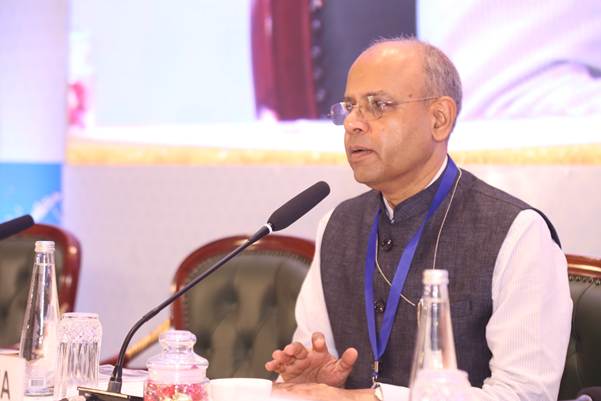
A presentation by Shri Vipul Ujjwal, Director - Ministry of Panchayati Raj reinforced the importance of attitude-behaviour consistency in rural transformation, citing the MAP model (Motivation, Ability, Prompt) for ensuring behavioural change at the grassroots. It was reiterated that Panchayats are the true fulcrum of sustainable and accountable service delivery.
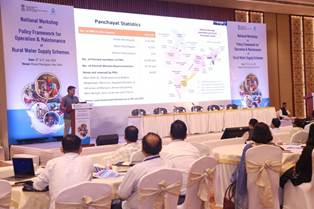
During the course of the day, participants engaged in thematic sessions covering a wide spectrum of digital innovations and institutional strategies.
The first session – ‘From Data Streams to Decision Engines’, showcased how technologies like real time monitoring, technology backed Decision Support System (DSS), AI-based predictive maintenance, IoT sensors, SCADA, etc. are helping in rural water supply governance, anticipate breakdowns, detect faults in real-time, ensuring equity in distribution, and optimize energy usage in water pumping systems. Discussions emphasized that technology is not a supplement, but the spine of governance in O&M. India-specific frugal engineering innovations and app-based dashboards highlighted for their cost-effectiveness and scalability in rural contexts.
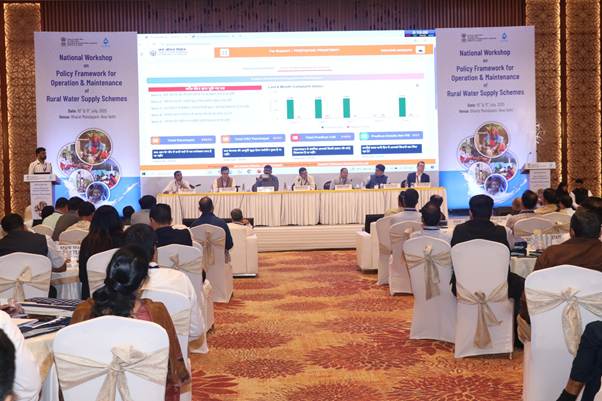
Next was a thematic presentation on ‘Harnessing GIS and Space Technology for Data-Driven Rural Water Governance’. Teams from Madhya Pradesh (PHED), BISAG-N, NRSC–ISRO, and AIILSG showcased pioneering applications of GIS, satellite imagery, and AI-driven tools. Madhya Pradesh demonstrated its integrated Jal Rekha platform for real-time monitoring, while BISAG-N highlighted the PM Gati Shakti framework for gap analysis and asset mapping. NRSC–ISRO shared innovations in groundwater sustainability, and AIILSG presented GIS solutions for predictive maintenance and citizen engagement in rural water services.
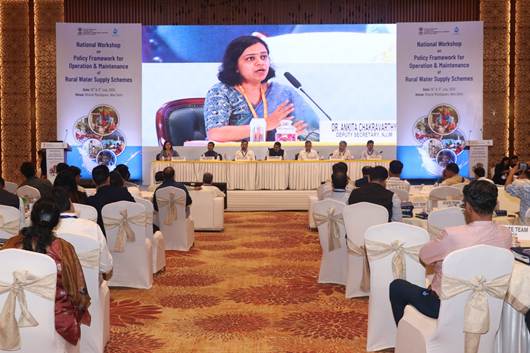
The topic for the third session was – Securing the Source. It focused on ensuring long-term functionality through source sustainability. A multi-tier institutional model, from the State to the village level, was proposed for effective implementation of Integrated Water Resource Management (IWRM) and community-centric governance. States like Tripura focus on groundwater recharge using dug and injection wells approved by CGWB, rainwater harvesting under Catch the Rain, and inter-agency coordination for recharge structures. Uttarakhand’s SARRA initiative targets spring rejuvenation through scientific, community-led planning, backed by the Jal Sanrakshan Abhiyan 2024. Nationally, NWIC promotes Water data One Data FAIR data sharing, while CGWB supports source sustainability via inventories and DPRs. NGOs like the Aga Khan Foundation strengthen efforts through CSR-based community engagement and capacity building under JJM.
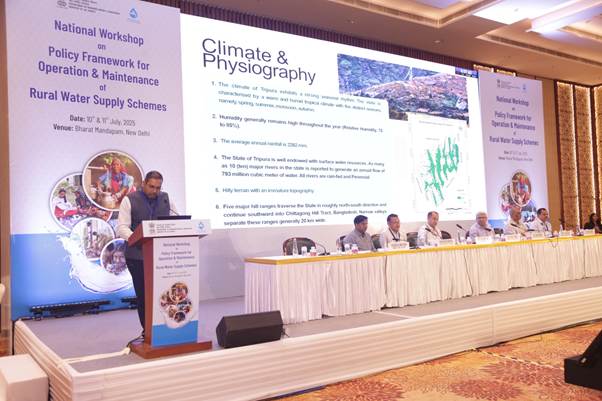
The final session was on Advancements in IT Applications Across States/ UTs. It illustrated the growing ecosystem of digital applications across Indian States/ UTs. From geotagging and digital billing systems to grievance redressal platforms and water quality dashboards, several States have shown significant progress. Key insights included:
- 79% of States/UTs have enabled digital bill payments.
- 46% offer online tracking of new water connections.
- 57% maintain digital consumer databases.
- Only 14% have water quality management systems linked with WQMIS — indicating a growth area.
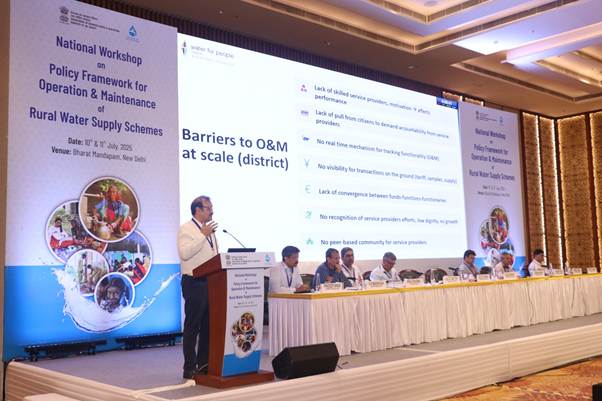
Each session was followed by question-and-answer rounds, providing a platform for cross-learning, field-level experience sharing, and contextual discussions. Experts from across sectors showcased pilot programmes and shared successful cases of digital and spatial interventions in water governance. The overarching message was clear: technology is not a choice but a necessity for the next phase of Jal Jeevan Mission.
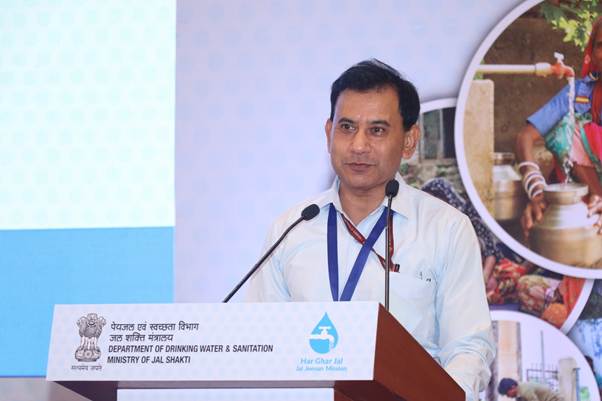
In his closing remarks, Shri Kamal Kishore Soan, AS&MD-DDWS, congratulated all participants for their active engagement and insightful contributions over the two days. He acknowledged the collaborative spirit of the workshop and expressed confidence that the deliberations, learnings, and innovations shared would shape a robust and future-ready O&M framework.
The workshop concluded with a collective call to action – to make transparency, accountability, and real-time monitoring the backbone of rural water service delivery. As Jal Jeevan Mission transitions into its next phase, it is evident that a synergistic blend of policy, people, and technology will be critical to ensuring that every tap delivers clean drinking water, every single day.
***
Dhanya Sanal K
Director
(Release ID: 2144103)
Visitor Counter : 204